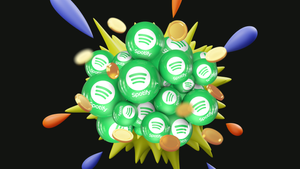The war between the US music publishers and Spotify over the streaming service’s sneaky audiobook bundling trick is now being fought on several fronts. While collecting society The MLC sues Spotify through the courts, the National Music Publishers Association has sent a formal complaint to the Federal Trade Commission and three Congress members have raised concerns with the Copyright Office.
In a letter sent yesterday, the NMPA urges the FTC to “address unlawful conduct by Spotify that is harming millions of consumers and the music marketplace”.
It notes how Spotify first added audiobooks to its main premium subscription product, and then added a dollar to the cost of that product and reclassified it as a ‘bundle’ to lower what royalties it pays to songwriters and music publishers. In doing so, it adds, Spotify “has engaged in a scheme to increase profits by deceiving consumers and cheating the music royalty system”.
More specifically, the NMPA argues that that scheme violates the US Restore Online Shoppers’ Confidence Act, because Spotify failed to “clearly and conspicuously” disclose the changes it was making to its products and didn’t get each subscriber’s “express informed consent” before making those changes. It also reckons that Spotify is violating Section Five of the FTC Act by “falsely representing that the ‘bundled’ premium plan adds substantial value to consumers”.
In Congress, Representatives Adam Schiff and Ted W Lieu, and Senator Marsha Blackburn, have all signed a letter to the Copyright Office. They say that the streaming service should not be able to “manipulate” the compulsory licence that covers song rights in the US in order to “slash royalties” and “deeply undercut copyright protections for songwriters and publishers”.
Seeking advice on what steps those writers and publishers should take to address the alleged manipulation, they add, “A fair system should prevent any big tech company from setting their own price for someone else’s intellectual property, whether the owner wants to sell or not”.
Spotify last year added fifteen hours of audiobooks access to its main premium subscription product. More recently it launched a standalone audiobooks subscription product in the US and added a dollar to the cost of the main premium product. More importantly, it also declared that its main product was now an audiobooks and music bundle, which has a big impact on the royalties it pays writers and publishers in the US.
Whereas in most countries Spotify negotiates bespoke deals with publishers and songwriter collecting societies in order to legally exploit song copyrights, in the US it relies on the compulsory licence, with industry-wide terms set every five years by a panel of judges. That licence allows services that bundle music with other content to pay a lower rate to publishers and writers, and Spotify is now relying on the bundle discount.
However, the publishers argue that Spotify's premium product isn't a true bundle, because the 50 million people signed up to it didn’t pick an audiobooks and music bundle. They just got audiobook access thrown in without asking for it, initially for free and now for an extra dollar a month.
Plus, to qualify for the bundle discount in the compulsory licence, the non-music content must have “more than token value”. The publishers reckon that the addition of audiobooks doesn't meet that requirement.
The MLC, which administers the compulsory licence, has sued Spotify over its decision to reclassify its main product as a bundle. The NMPA, meanwhile, has been very bombastic in its criticism of the streaming service, while also pointing out other grievances with Spotify's licensing practices in the US.
Speaking at the NMPA Annual Meeting yesterday, CEO David Israelite also revealed that, as well as the letter to the FTC, the organisation has urged state-level attorneys general in Tennessee, New York, California, Colorado, Georgia, Connecticut, Illinois, Washington DC, North Carolina and Oregon to investigate the streaming service’s recent conduct.
He added that, for anyone who thinks this multilayered approach to fighting Spotify “is overkill, welcome to our version of a bundle. We unapologetically will defend the rights of songwriters and music publishers, and this attack on songwriters ultimately will fail”.

